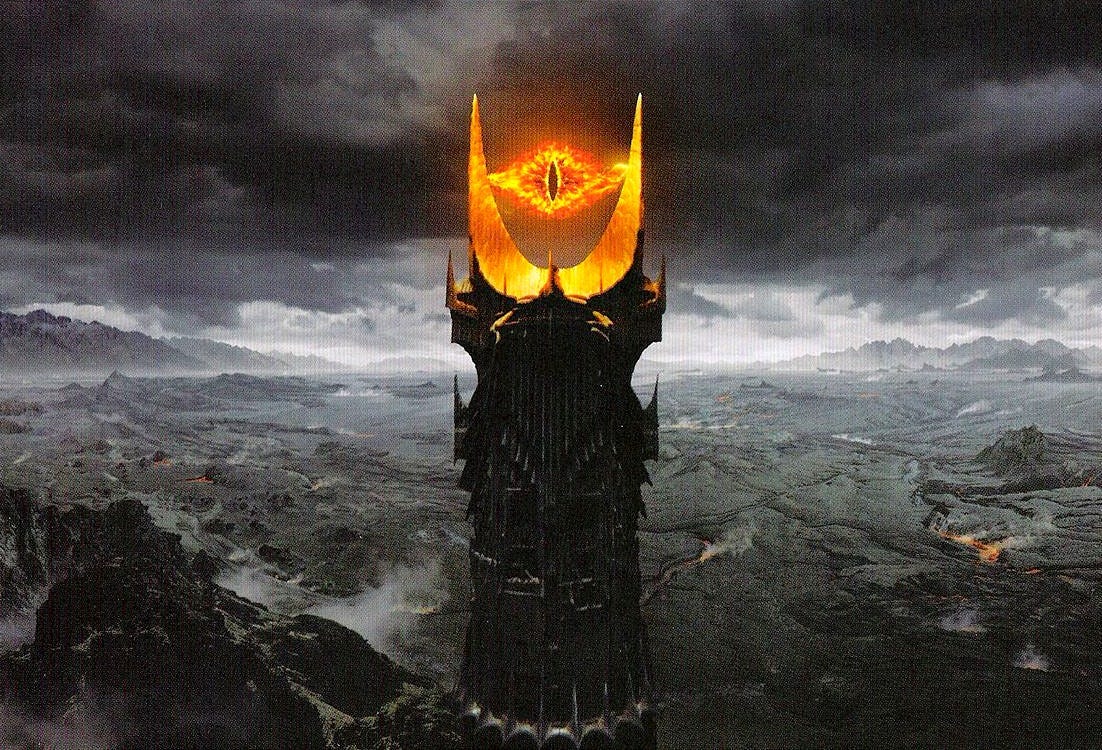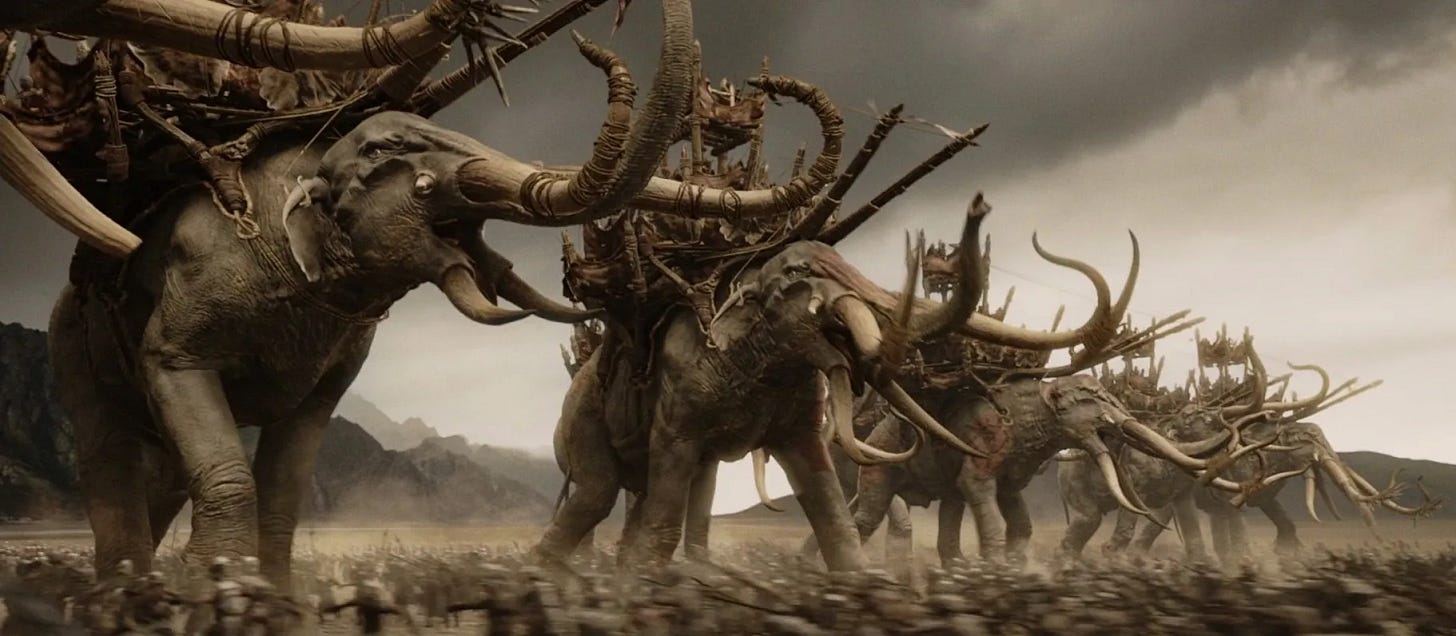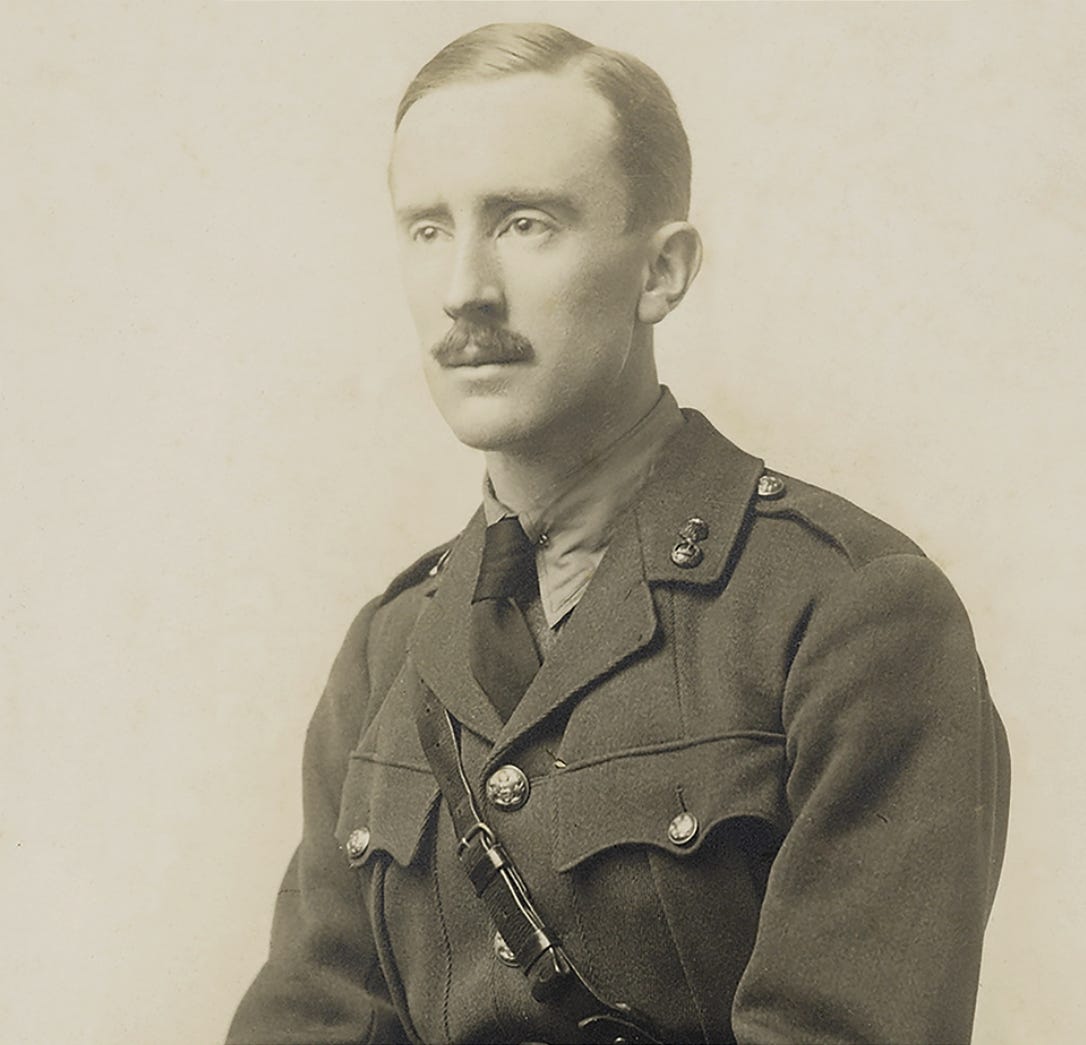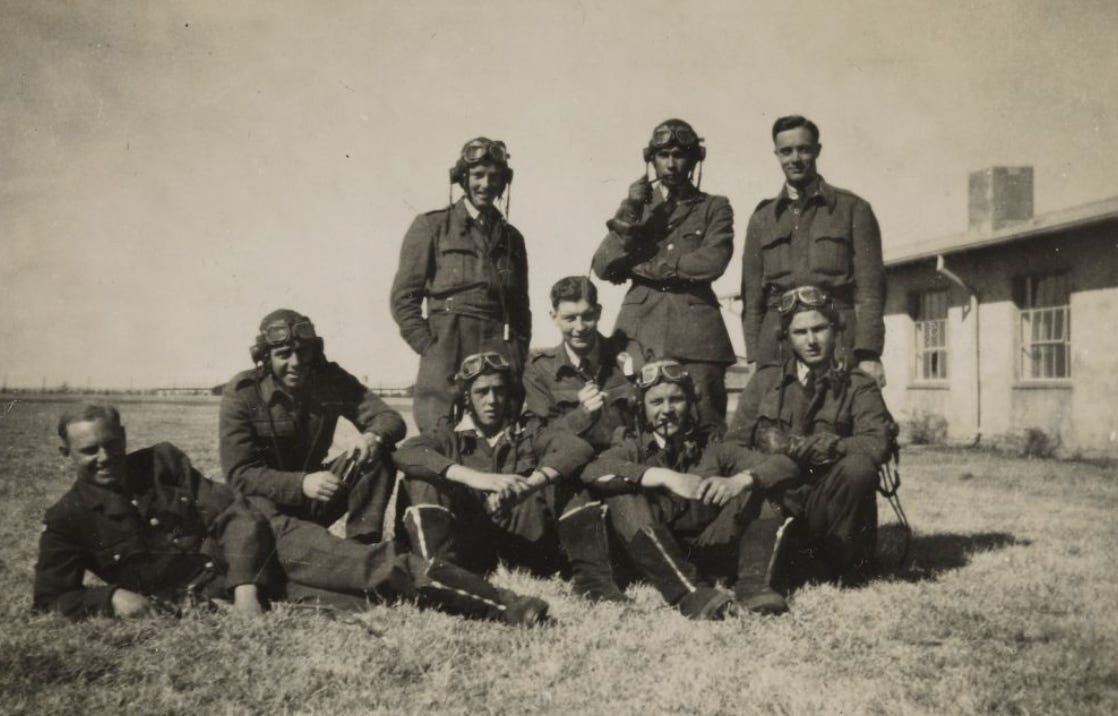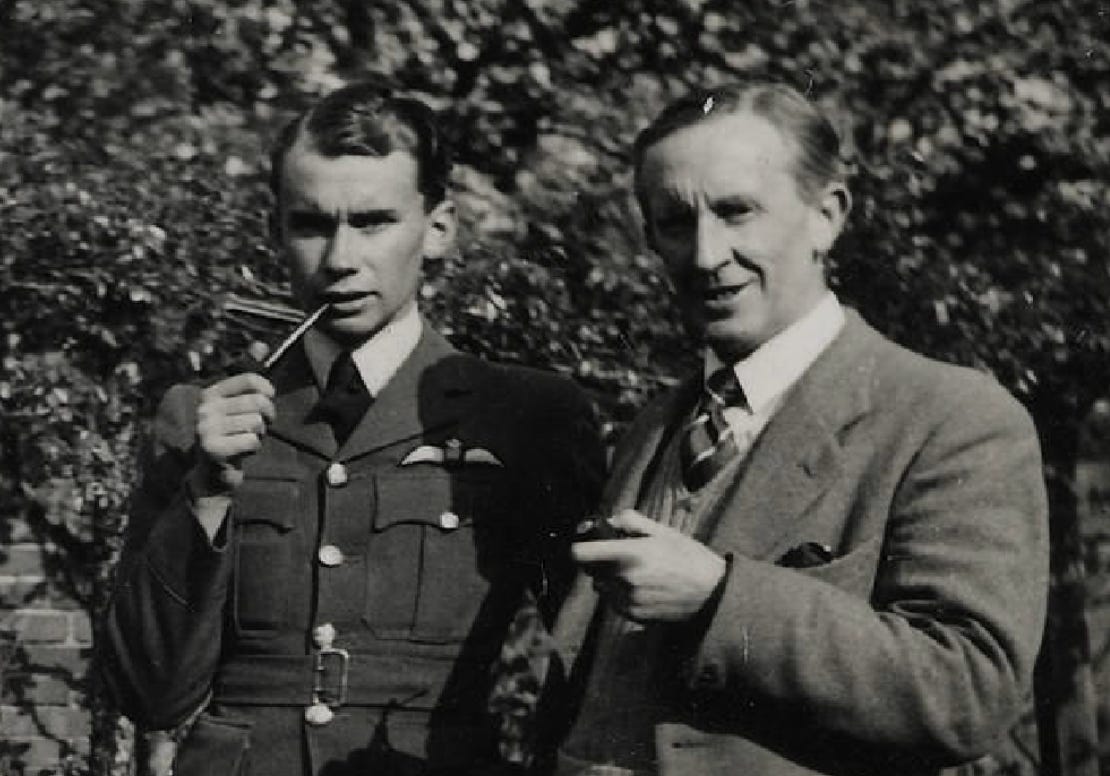Tolkien On Overcoming Evil
Why your fight matters...
Evil labours with vast power and perpetual success – in vain: preparing always only the soil for unexpected good to sprout in.
-J.R.R. Tolkien to his son Christopher
The author of The Lord of the Rings was no stranger to suffering. A veteran of the First World War, he had witnessed the slaughter of the Somme and the devastation of mechanized warfare. Nearly three decades later, he was forced to relive the horror from a distance as his son Christopher served as Royal Air Force pilot in World War II.
To encourage his son in the midst of what he deemed the “stupid waste of war,” Tolkien wrote him letters covering everything from theology to Middle-earth, the Blessed Sacrament, and songs about Oliphaunts. But for all the encouragement he offered, Tolkien never glossed over the brutal realities of the world at the time:
I sometimes feel appalled at the thought of the sum total of human misery all over the world at the present moment…
If anguish were visible, almost the whole of this benighted planet would be enveloped in a dense dark vapour, shrouded from the amazed vision of the heavens!
Yet beneath Tolkien’s grim realism lay a deep conviction in divine providence: a belief that even in history’s darkest hours, evil’s triumphs were fleeting. He reminded his son that “evil labours… in vain,” for God could bring forth “unexpected good” from even the worst of times.
Today, we look at one of Tolkien’s wartime letters to his son explore what it reveals about his view of good and evil, as well as his understanding of fatherhood. And, most importantly, what it can teach you about fighting for good in the face of darkness…
Onslaughts & Oliphaunts
From its opening line, Tolkien’s letter to his son is marked by tenderness:
My dearest: I have decided to send you another air letter, not an airgraph, in the hope that I may so cheer you up a little more..... I do miss you so, and I do find all this mighty hard to bear on my own account and on yours.
The author’s concern for his son is palpable from the outset, but so is his desire to encourage him. He doesn’t do this, however, by glossing over the tough realities of war. He instead addresses it directly, writing to Christopher honestly about the tragedy of the situation:
The utter stupid waste of war, not only material but moral and spiritual, is so staggering to those who have to endure it. And always was (despite the poets), and always will be (despite the propagandists) – not of course that it has not is and will be necessary to face it in an evil world…
I sometimes feel appalled at the thought of the sum total of human misery all over the world at the present moment: the millions parted, fretting, wasting in unprofitable days – quite apart from torture, pain, death, bereavement, injustice. If anguish were visible, almost the whole of this benighted planet would be enveloped in a dense dark vapour, shrouded from the amazed vision of the heavens!
Tolkien makes it clear he believes war to be both a “material and spiritual waste,” but also that it is “necessary to face in an evil world” — a nuanced view unfortunately lost on many today. Yet for all the anguish he expresses over the misery inflicted by war, Tolkien stops short of falling into despair.
We will see exactly why he has reason for hope in the sections that follow. But for now, let’s look at how he attempts to raise Christopher’s spirits. He begins by focusing on something else entirely, and turning to a passion he and his son shared:
On Thursday I gave 2 lectures and had some troublesome business in town and was too tired to attend the Lewis seance. I hope to see him tomorrow, and read some more of 'the Ring'. It is growing and sprouting again (I did a whole day at it yesterday to the neglect of many matters) and opening out in unexpected ways.
So far in the new chapters Frodo and Sam have traversed Sam Gebir, climbed down the cliff, encountered and temporarily tamed Gollum. They have with his guidance crossed the Dead Marshes and the slag-heaps of Mordor, lain in hiding outside the main gates and found them impassable, and set out for a more secret entrance near Minas Morghul (formerly M. Ithil). It will turn out to be the deadly Kirith Ungol and Gollum will play false. But at moment they are in Ithilien (which is proving a lovely land); there has been a lot of bother about stewed rabbit; and they have been captured by Gondorians, and witnessed them ambushing a Swerting army (dark men of South) marching to Mordor's aid.
A large elephant of prehistoric size, a war-elephant of the Swertings, is loose, and Sam has gratified a life-long wish to see an Oliphaunt, an animal about which there was a hobbit nursery-rhyme (though it was commonly supposed to be mythical). In the chapter next to be done they will get to Kirith Ungol and Frodo will be caught. Here is the rhyme cited by Sam:
Grey as a mouse,/Big as a house,/Nose like a snake,/I make the earth quake,/As I tramp through the grass ;/Trees crack as I pass./With horns in my mouth/I walk in the South/Flapping big ears./Beyond count of years/I've stumped round and round,/Never lie on the ground,/Not even to die./Oliphaunt am I,/Biggest of All,/huge, old, and tall./If ever you'd met me,/You wouldn't forget me./If you never do,/You won't think I'm trues/But old Oliphaunt am I,/and I never lie.
I hope that has something of the 'nursery rhyme' flavour. On the whole Sam is behaving well, and living up to repute…
By the time Tolkien wrote this letter in 1944, he was deep into drafting The Lord of the Rings. Since Christopher had grown up watching his father’s literary world take shape (and enjoyed every moment of it), these progress reports provided a welcome distraction, and a way for father and son to connect. As bombs thundered over England, Tolkien calmly and joyfully described Ithilien’s beauty, Gollum’s treachery, and Sam’s delight at seeing an Oliphaunt.
The effect this had on his son was striking: even in a world torn apart by violence, he was still able to cultivate a vision of courage, hope, and beauty. While Tolkien was undoubtedly concerned with his son’s physical safety, he never lost sight of the importance of joy and imagination in overcoming life’s trials.
Tolkien’s belief in the solace and strength offered by storytelling manifested itself not only in his art, but in his closest relationships with his family. This becomes particularly evident in what he tells his son next.
“The Vast Sum of Human Courage”
With Tolkien being Tolkien, the letter he wrote to his son contained far more than just updates on Sam and Frodo’s journey. Much like St. Louis IX’s letter to his son the prince, Tolkien’s correspondence with Christopher carried a moral weight beyond family news and literary progress reports.
Writing about the reason man never ceases to wage war even after witnessing its horrors, Tolkien writes:
But so short is human memory and so evanescent are its generations that in only about 30 years there will be few or no people with that direct experience which alone goes really to the heart. The burnt hand teaches most about fire.
Much of Tolkien’s genius lay in his ability to imbue observation with moral significance, and a perfect example of this is the phrase “the burnt hand teaches most about fire.” Even while observing, Tolkien was teaching, and helping his son to understand the workings of both politics and human nature.
But, of course, Tolkien didn’t just teach indirectly. In the passage that follows, he offers practical advice to Christopher on how to face the worst of life’s trials:
And though we need all our natural human courage and guts (the vast sum of human courage and endurance is stupendous, isn't it?) and all our religious faith to face the evil that may befall us (as it befalls others, if God wills) still we may pray and hope. I do.
He then immediately transitions to a beautifully personal note, to underscore the importance of fighting adversity with “all our natural human courage and guts”:
And you were so special a gift to me, in a time of sorrow and mental suffering, and your love, opening at once almost as soon as you were born, foretold to me, as it were in spoken words, that I am consoled ever by the certainty that there is no end to this.
Tolkien’s “certainty that there is no end to this” reflects his belief in the immortality of the soul and the eternal communion of saints. For him, family bonds and love are not obliterated by death, but fulfilled in Heaven. It is this fact which necessitates a courageous life of faith in the present, because, as Tolkien points out, it is in this life that you chart your course for eternity:
Probable under God that we shall meet again, 'in hale [health] and in unity', before very long, dearest, and certain that we have some special bond to last beyond this life – subject of course always to the mystery of free will, by which either of us could throw away 'salvation'. In which case God would arrange matters differently!
It is a simultaneously loving and sober reminder that virtue must be chosen, even amidst suffering. Tolkien knew the temptations of war — cynicism, despair, and moral compromise, to name a few — and sought to guide his son through them with wisdom anchored in faith.
Nowhere is this more obvious than in the next section, where he explains why evil can only ever prepare the soil “for unexpected good to sprout.” In the midst of tragedy, it is a hard truth to believe — but it is absolutely necessary if you desire to have the strength to keep fighting when the world seems at its darkest.


